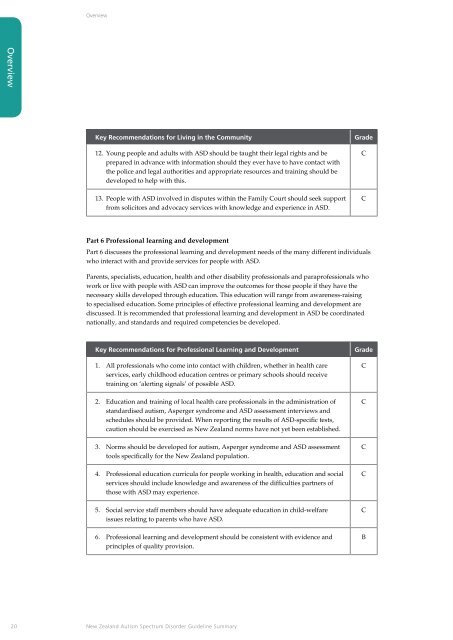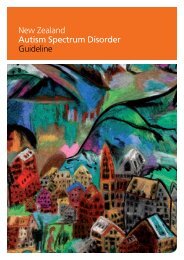New Zealand Autism Spectrum Disorder ... - Ministry of Health
New Zealand Autism Spectrum Disorder ... - Ministry of Health
New Zealand Autism Spectrum Disorder ... - Ministry of Health
Create successful ePaper yourself
Turn your PDF publications into a flip-book with our unique Google optimized e-Paper software.
Overview<br />
Overview<br />
Key Recommendations for Living in the Community<br />
12. Young people and adults with ASD should be taught their legal rights and be<br />
prepared in advance with information should they ever have to have contact with<br />
the police and legal authorities and appropriate resources and training should be<br />
developed to help with this.<br />
13. People with ASD involved in disputes within the Family Court should seek support<br />
from solicitors and advocacy services with knowledge and experience in ASD.<br />
Grade<br />
C<br />
C<br />
Part 6 Pr<strong>of</strong>essional learning and development<br />
Part 6 discusses the pr<strong>of</strong>essional learning and development needs <strong>of</strong> the many different individuals<br />
who interact with and provide services for people with ASD.<br />
Parents, specialists, education, health and other disability pr<strong>of</strong>essionals and parapr<strong>of</strong>essionals who<br />
work or live with people with ASD can improve the outcomes for those people if they have the<br />
necessary skills developed through education. This education will range from awareness-raising<br />
to specialised education. Some principles <strong>of</strong> effective pr<strong>of</strong>essional learning and development are<br />
discussed. It is recommended that pr<strong>of</strong>essional learning and development in ASD be coordinated<br />
nationally, and standards and required competencies be developed.<br />
Key Recommendations for Pr<strong>of</strong>essional Learning and Development<br />
1. All pr<strong>of</strong>essionals who come into contact with children, whether in health care<br />
services, early childhood education centres or primary schools should receive<br />
training on ‘alerting signals’ <strong>of</strong> possible ASD.<br />
2. Education and training <strong>of</strong> local health care pr<strong>of</strong>essionals in the administration <strong>of</strong><br />
standardised autism, Asperger syndrome and ASD assessment interviews and<br />
schedules should be provided. When reporting the results <strong>of</strong> ASD-specific tests,<br />
caution should be exercised as <strong>New</strong> <strong>Zealand</strong> norms have not yet been established.<br />
3. Norms should be developed for autism, Asperger syndrome and ASD assessment<br />
tools specifically for the <strong>New</strong> <strong>Zealand</strong> population.<br />
4. Pr<strong>of</strong>essional education curricula for people working in health, education and social<br />
services should include knowledge and awareness <strong>of</strong> the difficulties partners <strong>of</strong><br />
those with ASD may experience.<br />
5. Social service staff members should have adequate education in child-welfare<br />
issues relating to parents who have ASD.<br />
6. Pr<strong>of</strong>essional learning and development should be consistent with evidence and<br />
principles <strong>of</strong> quality provision.<br />
Grade<br />
C<br />
C<br />
C<br />
C<br />
C<br />
B<br />
20<br />
<strong>New</strong> <strong>Zealand</strong> <strong>Autism</strong> <strong>Spectrum</strong> <strong>Disorder</strong> Guideline Summary











